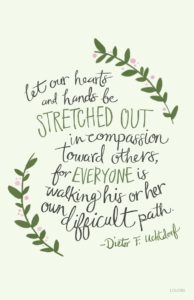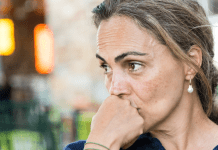As a pre-teen and teen I was exposed to mental health issues and the care of them in a really unhealthy way. As my mom struggled with depression by utilizing the tools she needed, therapy and even a hospital visit, I was shielded from the fact that what she was doing for her mental health was important and no different than treating any other disease.
Back in the mid-90’s there was a stigma surrounding mental health care and mental health disease that I bought in to because it was what I was taught by others. I’m so thankful that my mom was able to ignore that stigma and get the mental health care that she needed at that time. I’m only sorry that it took me until my early 20s to really understand why mental health care is just as important as physical health care.
While my mom passed away long before I became a mother myself, she gave me the gift of understanding and compassion regarding mental health. She also gave me the gift of knowledge. She impressed upon me statistics showing that mental health, specifically depression, can run in families. I was lucky to know my own family history of depression and be cognizant of my mom’s untreated postpartum depression so that I could advocate for myself after the birth of my own child if needed. My husband and I were both careful to watch for tell tale signs, and I took my OBGYN’s checks seriously. Things were looking good.
Fast forward two years and I realized that behaviors I had chalked up to the exhaustion of being a mom and working full time and a wife were actually unchecked boxes on long list of signs that some mental health care was needed after all. I was just … not OK. That’s when I learned that postpartum depression and anxiety can not only rear their ugly heads in different ways, but also that they can happen even a year or two after birth. Hormone imbalances that affect the brain can occur at many times.
For me, a big shift happened when I stopped breastfeeding when my daughter was two and a half. At the time my husband and I were going to couples counseling and the clarity that that provided allowed me to see that my mental state was not going to change in the ways I needed without some additional intervention. I was so fortunate to find that my doctor was open to hearing my concerns and more than willing to work with me to find the right chemical balance for my brain. She helped me find the tools I needed to improve my mental health in the form of one little blue pill each day.
It was kind of a gut punch to me at first being prescribed an antidepressant. While I have obviously evolved from that scared middle school kid who was missing her mom and being fed bad information about the evilness of therapists and hospital stays, those old thoughts came right back and with them a lot of fear.
It was scary to be taking medication every day. It was scary to think that the tough mental health fights that several women in my family had fought were fights I may end up fighting. It was scary to think that I equated needing mental healthcare with not being strong, because I knew that asking for help in no way equaled weakness. It was scary to admit to my husband that I could not, in fact, just get past it like I had done in other hard times.
Hindsight being 20/20 and all, I could have used that mental healthcare years earlier. I was just too stubborn and subconsciously attached to those stigmas that are only now (too slowly) being eradicated surrounding mental health diseases.
 In the end though, I got myself out of my own way and took the help I needed. I worked with my doctor to perfect dosages and opened up to friends about my struggles. The thing that amazed me was that they opened up to me, too, about their own struggles, their own internal dialogues surrounding mental healthcare, and their own little blue pills .
In the end though, I got myself out of my own way and took the help I needed. I worked with my doctor to perfect dosages and opened up to friends about my struggles. The thing that amazed me was that they opened up to me, too, about their own struggles, their own internal dialogues surrounding mental healthcare, and their own little blue pills .
Two years later, I still struggle some days, and I still need that chemical balance. But I have no qualms about fiercely defending the need for mental healthcare and the need to completely eradicate the stigmas that surround it. Most importantly, I can now teach my daughter in a healthy and productive way about why taking care of your mental health is just as important as your physical health. I’m not scared to tell her about her family history of mental health diseases, because I know her dad and I will never let her think that seeking help is anything other than the best way to love herself.
If you’re struggling with mental health, postpartum issues or feel like things are overwhelming, please reach out.
















